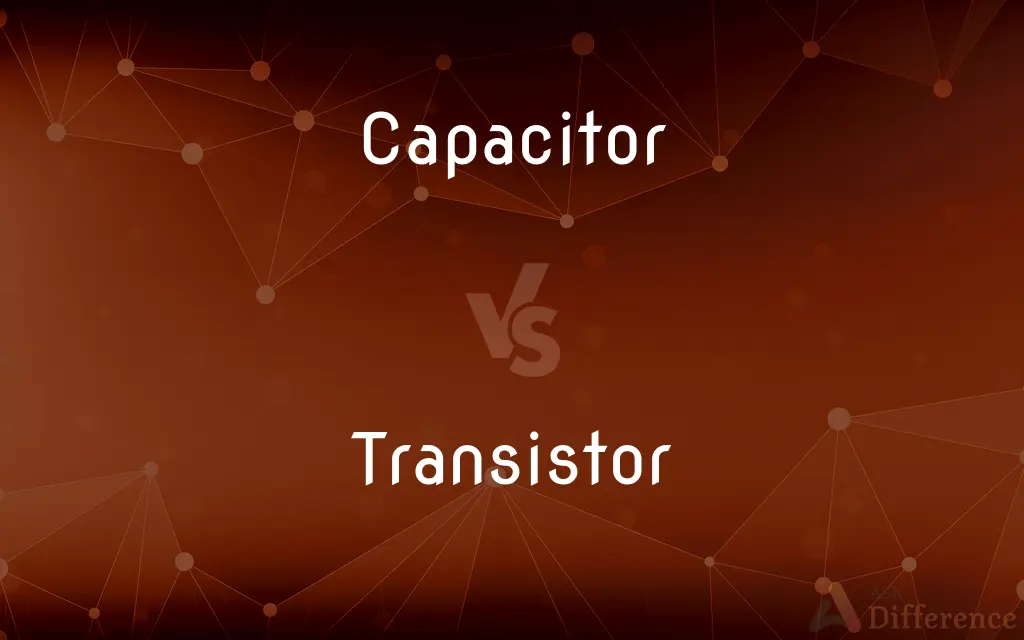Capacitor vs. Transistor — What's the Difference?
By Tayyaba Rehman — Updated on September 18, 2023
A capacitor stores and releases electrical energy, while a transistor amplifies and switches electronic signals and power.

Difference Between Capacitor and Transistor
Table of Contents
ADVERTISEMENT
Key Differences
A capacitor is fundamentally an electronic component designed to store and release electrical energy in a circuit. On the other hand, a transistor is a semiconductor device utilized to amplify or switch electronic signals and power, serving as a fundamental building block in modern electronic devices.
At the core of a capacitor, two conductive plates are separated by an insulator. When voltage is applied, it stores energy electrostatically. In contrast, a transistor typically comprises three layers of a semiconductor material, each capable of carrying a current. It acts as both a switch and an amplifier.
One of the primary functions of capacitors is to smooth out fluctuations in power supply voltages. Transistors, conversely, can be found at the heart of a vast range of applications from radio frequency amplification to digital logic gates in computers.
Capacitors come in various types like ceramic, electrolytic, and tantalum, each with specific applications and characteristics. Transistors, too, have their variants such as bipolar junction transistors (BJT) and field-effect transistors (FET), each suited for particular electronic functions.
While both capacitors and transistors are indispensable components in the world of electronics, their functions are distinct. A capacitor focuses on energy storage and release, while a transistor is all about signal processing, whether it's amplification or switching.
ADVERTISEMENT
Comparison Chart
Primary Function
Stores and releases electrical energy
Amplifies and switches electronic signals
Composition
Two conductive plates separated by an insulator
Three layers of semiconductor material
Role in Circuit
Smooth out voltage fluctuations
Act as a switch or amplifier
Varieties
Ceramic, electrolytic, tantalum, etc.
Bipolar junction transistors (BJT), field-effect transistors (FET), etc.
Application in Devices
Power supplies, radios, etc.
Radios, computers, amplifiers, etc.
Compare with Definitions
Capacitor
A component that can smooth out voltage fluctuations.
Use a capacitor to prevent sudden voltage spikes in the device.
Transistor
An electronic gate or switch in digital circuits.
Modern CPUs have billions of transistors on them.
Capacitor
A device with two conductive plates separated by an insulator.
When charged, a capacitor holds energy between its plates.
Transistor
A semiconductor device for amplifying or switching signals.
The transistor in the amplifier boosts the audio signal.
Capacitor
An electronic component that stores energy.
The capacitor in the circuit maintains the voltage stability.
Transistor
A fundamental building block in modern electronics.
Transistors revolutionized the electronics industry in the 20th century.
Capacitor
An element used in AC circuits to introduce capacitance.
The radio uses a capacitor to tune into different frequencies.
Transistor
A device that can control current flow based on input voltage.
By applying voltage to the transistor's base, we can control its output.
Capacitor
A device used to store an electric charge, consisting of one or more pairs of conductors separated by an insulator.
Transistor
A three-layered semiconductor component.
The transistor has distinct base, collector, and emitter regions.
Capacitor
A capacitor is a device that stores electrical energy in an electric field. It is a passive electronic component with two terminals.
Transistor
A transistor is a semiconductor device used to amplify or switch electronic signals and electrical power. Transistors are one of the basic building blocks of modern electronics.
Capacitor
An electric circuit element typically consisting of two metallic plates separated and insulated from each other by a dielectric, used to store charge temporarily or to filter signal frequencies. Also called condenser.
Transistor
A semiconductor device with three connections, capable of amplification in addition to rectification.
Capacitor
(electronics) An electronic component capable of storing electrical energy in an electric field; especially one consisting of two conductors separated by a dielectric.
Transistor
A small electronic device containing a semiconductor and having at least three electrical contacts, used in a circuit as an amplifier, detector, or switch.
Capacitor
A device used in electronic circuits to hold electrical charge, consisting of two conducting plates separated by a nonconducting (dielectric) medium; it is characterized by its capacitance.
Transistor
Any of various devices serving the same purpose but employing a different technology
An optical transistor.
Capacitor
An electrical device characterized by its capacity to store an electric charge
Transistor
A transistor radio.
Capacitor
A device that accumulates and discharges electrical charge.
Ensure the capacitor is fully discharged before handling it.
Transistor
(semiconductors) A solid-state semiconductor device, with three terminals, which can be used for amplification, switching, voltage stabilization, signal modulation, and many other functions.
Transistor
A transistor radio.
Transistor
A component used in electronic devices consisting of three regions of at least two types of a semiconducting material, such as doped silicon, connected to each other and to three electrodes in a conducting path so as to modify the current or voltage in an electronic circuit.
Transistor
A semiconductor device capable of amplification
Common Curiosities
How does a transistor work?
A transistor amplifies or switches electronic signals, using its three semiconductor layers.
Can a capacitor amplify signals like a transistor?
No, a capacitor stores energy; it doesn't amplify signals like a transistor does.
What is the primary function of a capacitor?
A capacitor primarily stores and releases electrical energy.
Why do power supplies often have capacitors?
Capacitors help smooth out voltage fluctuations in power supplies.
In what devices might I find transistors?
Transistors are in many devices, from radios to computers.
Which is bigger in size: capacitors or transistors?
Capacitors can range in size, while transistors, especially in ICs, are microscopic.
Can I replace a capacitor with a transistor in a circuit?
No, capacitors and transistors have distinct functions and aren't interchangeable.
Are there different types of capacitors and transistors?
Yes, there are various types, like ceramic capacitors and bipolar junction transistors.
Can a circuit function without a capacitor?
Depending on the circuit's purpose, it might work but may not perform optimally without a capacitor.
How has the transistor impacted modern technology?
Transistors revolutionized electronics, enabling miniaturization and powerful computing.
Share Your Discovery

Previous Comparison
Dramatic vs. Melodramatic
Next Comparison
Quantify vs. QualifyingAuthor Spotlight
Written by
Tayyaba RehmanTayyaba Rehman is a distinguished writer, currently serving as a primary contributor to askdifference.com. As a researcher in semantics and etymology, Tayyaba's passion for the complexity of languages and their distinctions has found a perfect home on the platform. Tayyaba delves into the intricacies of language, distinguishing between commonly confused words and phrases, thereby providing clarity for readers worldwide.
















































